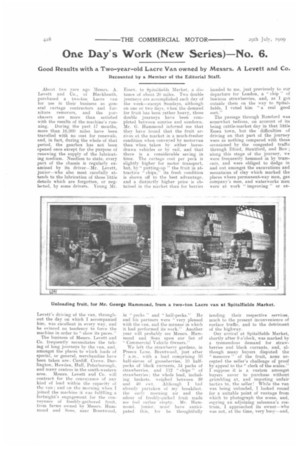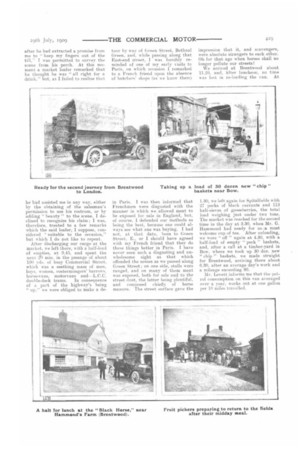One Day s Work (New Series) No. 6.
Page 4

Page 5

If you've noticed an error in this article please click here to report it so we can fix it.
Good Results with a Two-year-old Lacre Van owned by Messrs. A Levett and Co.
Recounted by a Member of the Editorial Staff.
About two yars ago Messrs. A. Levett and Co., of Blackheath, purchased a two-ton Lacre van tor use in their business as general eartage contractors and furniture removers, and the purchasers are more than satisfied with the results of the machine's running. During the past 17 months, more than 16,000 miles have been travelled with no cost for renewals, and, in fact, during the whole of that period, the gearbox has not been opened once except for the purpose of renewing the supply of the lubricating medium. Needless to state, every part of the chassis is regularly examined by its driver—Mr. Levett, junior—who also most. carefully attends to the lubrication of those little details which are forgotten, or neglected, by some drivers. Young Mr.
Levett's driving of the van, throughout the day on which I accompanied him, was excellent in every way, and he evinced no tendency to force the machine in order to " show its paces." The business of Messrs. Levett and Co. frequently necessitates the taking of long journeys by the van, and, amongst the places to which loads of special, or general, merchandise have been taken are Cardiff, Crewe, Darlington, Bowden, Hull, Peterborough, and many centres in the south-western area. Messrs. Levett and Co. will contract for the conveyance of any kind of load within the capacity of the van : and on the morning when I joined the machine it was fulfilling a fortnight's engagement. for the convey-ance of freshly-gathered fruit, from farms owned byMessrs. Hammond and Sons, near Brentwood,
Essex, to Spitalfields Market, a distance of about 20 miles. Two double journeys are accomplished each day of the week—except Sundays, although on one or two days, when the demand for fruit has been rather heavy, three double journeys have been completed between sunrise and sundown. Mr. G. Hammond informd me that they have found that the fruit arrives at the market in a much-fresher condition when conveyed by motorvan than when taken by either horsedrawn vehicles or by rail, and that there is a considerable saving in time. The cartage cost per peck is slightly higher for motor transport, but, by " putting-up " the fruit in attractive " chips," its fresh condition is shown off to the best advantage, and a distinctly higher price is obtained in the market than for berries in " pecks " and " half-peeks." Re and his partners were "very pleased with the van, and the manner in which it had performed its work." Another year will probably see Messrs. Hammond and Sons upon our list of " Commercial Vehicle Owners."
We left the strawberry gardens, in Preece Lane, Brentwood, just after 7 a.m., with a load comprising 50 half-sieves of gooseberries, 10 halfpeeks of black currants, 54 pecks of strawberries, and 112 " chips " of strawberries; the whole load, including baskets. weighed between 38 and 40 cwt. Although I had already partaken of my breakfast. the early morning air and the odour of freshly-picked fruit made me feel rather empty. Mr. Hammond, junior, must have anticipated this, for he thoughtfully handed to me, just previously to our departure for London, a " chip " of luscious strawberries, and, as 1 got outside them on the way to Spitalfields, I voted him " a real good sort."
The passage through Romford was somewhat tedious, on account of its being cattle-market day in that little Essex town, but the difficulties of driving on that part of the journey were as nothing compared with those occasioned by the congested traffic through Ilford, Stratford, and Bow ; along this stage of the journey, we were frequently hemmed in by tramcars, and were obliged to dodge in and out amongst the excavations and mountains of clay which marked the places where permanent-way men, gas company's men, and waterworks men were at work " improving " or ex tending their respective services, much to the present inconvenience of surface traffic, and to the detriment of the highway.
Our arrival at Spitalfields Market, shortly after 9 o'clock, was marked by a tremendous demand for strawberries and black currants, and, although many buyers disputed the " measure " of the fruit, none accepted the seller's challenge of proof by appeal to the " clerk of the scales.'' I suppose it is a custom amongst buyers never to purchase without grumbling at, and imputing unfair tactics to, the seller? While the van was being unloaded, I looked round for a suitable point of vantage from which to photograph the scene, and, espying an adjoining salesman's rostrum, I approached its owner—who was not, at the time, very busy—and, after he had extracted a promise from me to keep my fingers out of the till," 1was permitted to survey the scene from his perch. At this moment a market loafer remarked that he thought he was " all right for a drink," but, as I failed to realize that he had assisted me in any way, either by the obtaining of the salesman's permission to use his rostrum, or by adding " beauty" to the scene. I declined to recognize his claim; I was, therefore, treated to a few remarks which the said loafer, I suppose, considered '' suitable to the occasion," but which I do not like to repeat.
After discharging our cargo at the market, we left there, with a. half-load of empties, at 9.45, and spent the next 21) min. in the passage of about 100 yc6. of busy Commercial Street, which was a seething mass of men, boys, women, costermongers' barrows, horse-vans, motorvans and—L.C.C.
double-deck trams. In consequence of a part of the highway's being " up," we were obliged to make a de
tour by way of Green Street, Bethnal Green, and. while passing along that East-end street, I was forcibly reminded of one of my early visits to Paris, on which occasion 1 remarked to a French friend upon the absence of butchers' shops (as we know them) in Paris. I was then informed that Frenchmen were disgusted with the manner in which we allowed meat to be exposed for sale in England, but, of course, I defended our methods as being the best, because one could always see what one was buying. I had not, at that date, been to Green Street, E., or I should have agreed with my French friend that they do these things better in Paris. I have never seen such a disgusting and unwholesome sight as that which offended the senses as we passed along Green Street; on one side, stalls were ranged, and on many of them meat was exposed, both for sale and to the street dust, the latter being plentiful, and composed chiefly of horse manure. The street surface gave the impression that it, and scavengers, were absolute strangers to each other. Oh for that age when horses shall no longer pollute our streets! We arrived at Brentwood about 11.20, and, "after luncheon, no time was lost in re-loading the van. At 1.30, we left again for Spitalfields with 27 pecks of black currants and 113 half-sieves of gooseberries, the total load weighing just under two tons. The market was readied for the second time in the day at 3.30, when Mr. G. Hammond had ready for us-a most welcome cup of tea. After unloading, we were "off " again at 4.30, with a half-load of empty " peck " baskets, and, after a call at a timber-yard in Bow, where we took up 30 doz. new "chip " baskets, we made straight for Brentwood, arriving there about 6.30, after an average day's work and a mileage exceeding 80. Mr. Levett informs me that the petrol consumption on this van averaged over a year, works out at one gallon per 16 miles travelled,


















